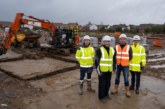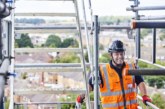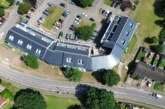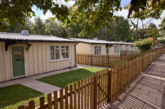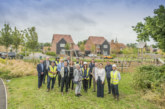
Technology is part of our everyday lives. However, the digital divide is becoming more apparent. The larger the divide, the larger the social inequalities, as Grain Connect tells LABM.
According to the 2017 consumer digital index, more than 3.1m people in the UK lack basic digital skills. Of these, more than 63% are social housing tenants. ‘Digital skills’ includes the ability to use a search engine to find information, complete online application forms, manage money or solve a problem using a digital service.
 Local authorities and social housing organisations are already responding to this issue by shaping policy and providing opportunities for people to learn new skills. However, there is still the fundamental issue of access to affordable, reliable, fast internet connection in the first place.
Local authorities and social housing organisations are already responding to this issue by shaping policy and providing opportunities for people to learn new skills. However, there is still the fundamental issue of access to affordable, reliable, fast internet connection in the first place.
Grain Connect Managing Director Rich Robinson commented: “The Government has identified that inadequate infrastructure and poor connectivity are the main barriers to digital inclusion and, with social housing often the main tenure to fall short in this area, now is the time for local authorities to look at innovative and cost-effective ways to meet this need.”
Faster solutions
Grain is the latest and most advanced fibre broadband company in the country. UK owned and operated, the Grain network offers residents broadband speeds of well over 1,000Mbs, 35 times faster than the UK average. While traditionally focusing on new-build projects to install its technology during the development phase, the company has turned to local authorities and mixed-tenure estates in a bid to offer better, faster, cheaper solutions.
Rich added: “We are actively pursuing partnerships with councils and housing associations where we work together to bridge the digital exclusion gap, offering solutions to allow social residents to more actively participate in society and increase their skills.
“Government has identified that inadequate infrastructure and poor connectivity are the main barriers to digital inclusion and, with social housing often the main tenure to fall short in this area, now is the time for local authorities to look at innovative and cost-effective ways to meet this need.”
“Because we are smaller than some of the other national providers, we can tailor the solution and be more agile to meet the needs of mixed-tenure developments. We are always looking for projects across the board in terms of affordability because our network and project management teams have proven to deliver regardless of location, size and complexity of the building. In this sense, the main benefit here for local authorities and housebuilders is that we absorb the cost associated with designing, integrating, installing and operating our full fibre network.”
Old infrastructure
Given that a large proportion of social housing estates in the UK are older developments, there is often the issue of attempting to navigate outdated infrastructure only to find that it simply does not support new technology. In order to connect residents to fast, reliable broadband, often the only option is to retrofit the foundations.
Rich commented: “Retrofitting a block is a bit more complex as you need to seek the permission from owners and tenants, however it is certainly possible and perhaps less intrusive than you might think.”
“It is a very exciting time — not only in regards to accessing internet speeds barely seen in this country, but in making it easier, cheaper, faster for everyone — regardless of your housing tenure — to be a part of the transformation, and bridging the digital divide once and for all.”


